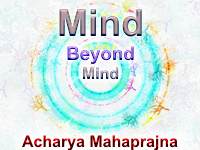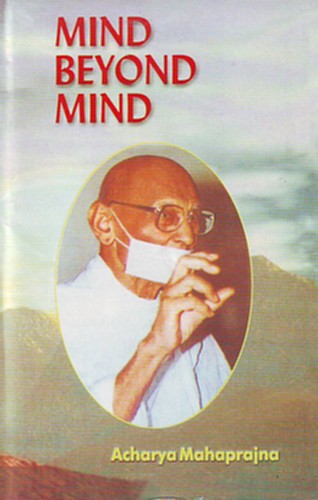
The Jain tradition speaks of twenty-four Labdhis (accomplishments). One of them is called Sambhinnasrotolabdhi. The practitioner, who attains this accomplishment by entering into a particular development of consciousness, becomes competent to employ any sense organ for any kind of perception. He can hear sounds with the help of the eyes, and see things with the help of the ears and so on. He can even hear and see things with the help of the fingers. For him every sense organ can successfully perform the function of every other sense organ. This proves that the classification of knowledge on the basis of the sense organs is misleading and wrong. Knowledge is one and indivisible. Sambhinnasrotolabdhi literally means the opening of all the sources. In such a case there is no necessity to see with the eye only or to hear with the ears only and so on. Every sense organ is capable of performing the function of every other sense organ.
That the ears alone hear sounds has been disproved by experience. It is due to a long training spread over age’s altogether that we have made the ears the principal means of sound perception. The teeth are a better means of hearing. The example of Rosa Kuleschova, a Russian girl, is highly instructive. She can read letters by moving her fingers on a piece of printed paper and keeps her eyes shut with a ribbon while she is doing this. She can also see through a glass and perceive an object without using her eyes. The blind also read letters with the help of their fingers provided the letters have been embossed on a piece of paper. They are given training in this kind of reading with the help of the fingers. Rosa Kuleschova, of course, can read ordinary letters also. The classification of the sense organs on the basis of a tradition of a long specialization in particular areas of perception and habit should not mislead us. There is nothing natural in it. If consciousness develops, it can enable us to employ any sense organ for any kind of perception.
Likes, dislikes, and preferences have also come to be classified on the basis of the division of the functions of the sense organs, which is also the result of a long artificial tradition. As a matter of fact, there is a continuous stream of attachments and aversions in us like the continuous stream of consciousness. Both these streams should not be classified on the basis of the sense organs. They are independent of the specialization of the sense organs.
What is then the reason behind the specialization of the sense organs in spite of the fact that the two streams of consciousness and of attachments and aversions are undivided in themselves? The reason is the Samskaras or subconscious predilections created out of the traces left behind by earlier desires. Environment also plays an important part in the specialization of the sense organs. The currents of consciousness and attachment and aversions can be compared to the flow of a river. We divert the waters of the river into various channels and sub channels for purposes of irrigation. The water of the major current is carried into different channels to irrigate separate plots of the field. An inlet is cut into the individual plot to let the flowing water in. As soon as one plot has been watered the inlet is closed to divert the flowing water to another plot. This is what has happened to the sense organs also. The current of passions, which fed all the sense organs together, became divided according to the individual sense organs with the result that the sense organs became cut off from the main stream. This resulted in the consolidation of Samskaras and the creation of separate habits in each sense organ.
Blood circulates in every part of the body, but if we resolve to feel its flow in a particular part of the body only, its flow will be concentrated on that part only. This may happen in the case of the Prana current also. A manipulated flow of Prana, blood and attachments and aversions consciously diverted to a particular part of the body only becomes associated with earlier experiences and strengthen predilections. Consciousness, blood, and Prana are thus diverted into particular areas according to our choices or preferences, which combined with the predilections, produce specializations. Therefore, if we want to control the sense organs, we will have to control the passions, attachments, and aversions. All the sense organs do not function in the same way in every body. Somebody's eyes may be more active than the remaining senses. Somebody's tongue may be more active than his ears and so on. One who wants to control his sense organs must first know which of his sense organs is the most active and which object does it crave for more than other objects. The next step is not to allow attachments and aversions to flow towards that particular sense organ and object. This can be achieved by constant practice. Moreover, he should be constantly watchful and check up his progress from time to time. Discipline of the sense organs is not only profitable in Sadhana but also for the health of the body and the mind.
It was enjoined upon the princes in ancient India that they should discipline their sense organs. A prince cannot administer his kingdom properly, if he indulged in a life of sensual pleasures. Social leaders must also practice such a discipline otherwise they are likely to neglect their responsibility. As a matter of fact this is necessary for every one otherwise there may be imbalance and disorder in life. There are three things: Yoga, absence of Yoga and too much of Yoga. According to Caraka, if you do not use a sense organ for a long time, it may lose its potential in the course of time. If you do not use your eyes for a long time their functional capacity may deteriorate. If you keep an arm twisted for a long time, it becomes stiff. Yoga with reference to the sense organs means the continuity of their functioning. On the other hand, if you exert a sense organ too much it becomes gradually weak. We should, therefore, go on using the sense organs methodically and in a disciplined way. They also need periodical rest. Work and rest that is the principle to be followed. There should be neither undue rest nor undue work. This is necessary for health also. The normal functioning of the sense organs does not amount to indiscipline. Indiscipline is the result of the obstruction in the normal functions of the sense organs produced by mental attitudes and predilections.
The mind should not be allowed to interfere with the sense organs. Nothing from the mind should be mixed with the operation of the senses. Discipline of the sense organs means the preservation of their natural purity. Therefore, it means control of the passions. What is aimed at is not to allow passions to pollute the stream of sense experiences. This needs constant self-watchfulness.
Indiscipline of the sense organs produces immediate results. If you eat too much, you will upset the digestive system in no time. We hear of deaths caused by drinking illicit wines. The mechanism, which produces these consequences, lies within us.
Those who accumulate money and riches by illegal means may command a social status, but if you looked within them you will find their minds torn and tormented. Deceit and fraud produce immediate consequences. The evil within us works its own way. Marx spoke of the dialectical process of thesis, antithesis, and synthesis, of the continuous process of the clash of opposites. This dialectical movement operates in every field of life. It applies to politics, social relations and even to religion. The contradiction of the thesis and antithesis is inherent in the thesis itself. The thesis must produce its antithesis by the potential presence of the latter in the former. The child begins to die from the very moment it is born. We often say that so and so died at the age of sixty or eighty. This is incorrect. One who has lived up to the age of sixty or eighty will never die. He transcends death. Death comes into being at the very moment of birth. Every moment henceforward is a moment ofdeath. The cumulative effect of all these moments is what is called death. Let us take the example of an earthen pot. It will break the moment you struck it with a stone or rod. The process of disintegration had started from the very moment in which the pot came into existence and took shape on the potter's wheel. This process reaches its culmination in the moment when the pot is struck with a stone or a rod. If this process had not come into being at the time of the production of the pot, it will never break even if you struck it. Every thesis is opposed by an antithesis and every existence by obliteration. In the trio of thesis, antithesis, and synthesis, the last represents the force, which sustains things. Synthesis means the passing out of the old and the emergence of the new. Human psychology is also governed by the law of dialectical change. Acharya Mahaprajna
Acharya Mahaprajna

